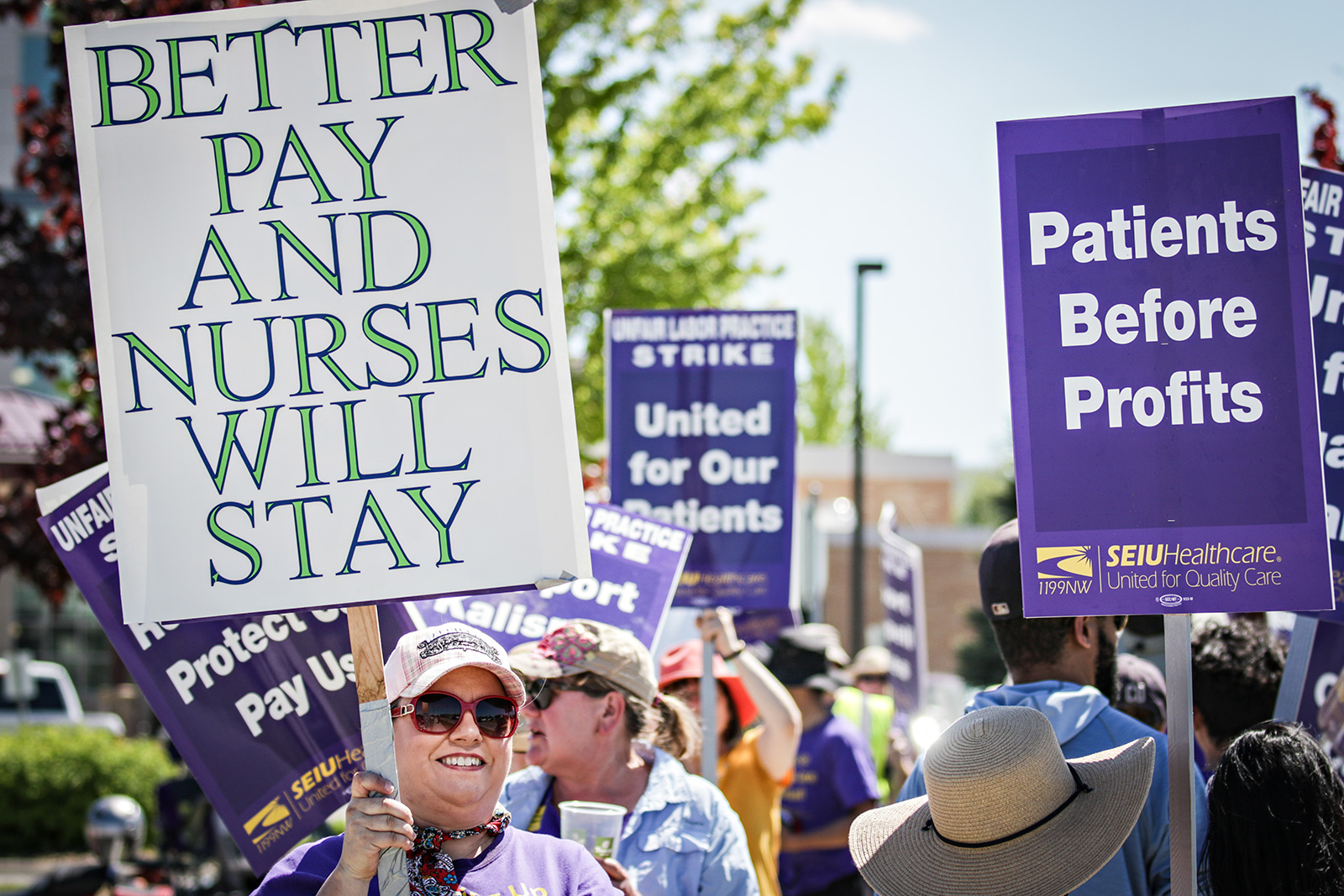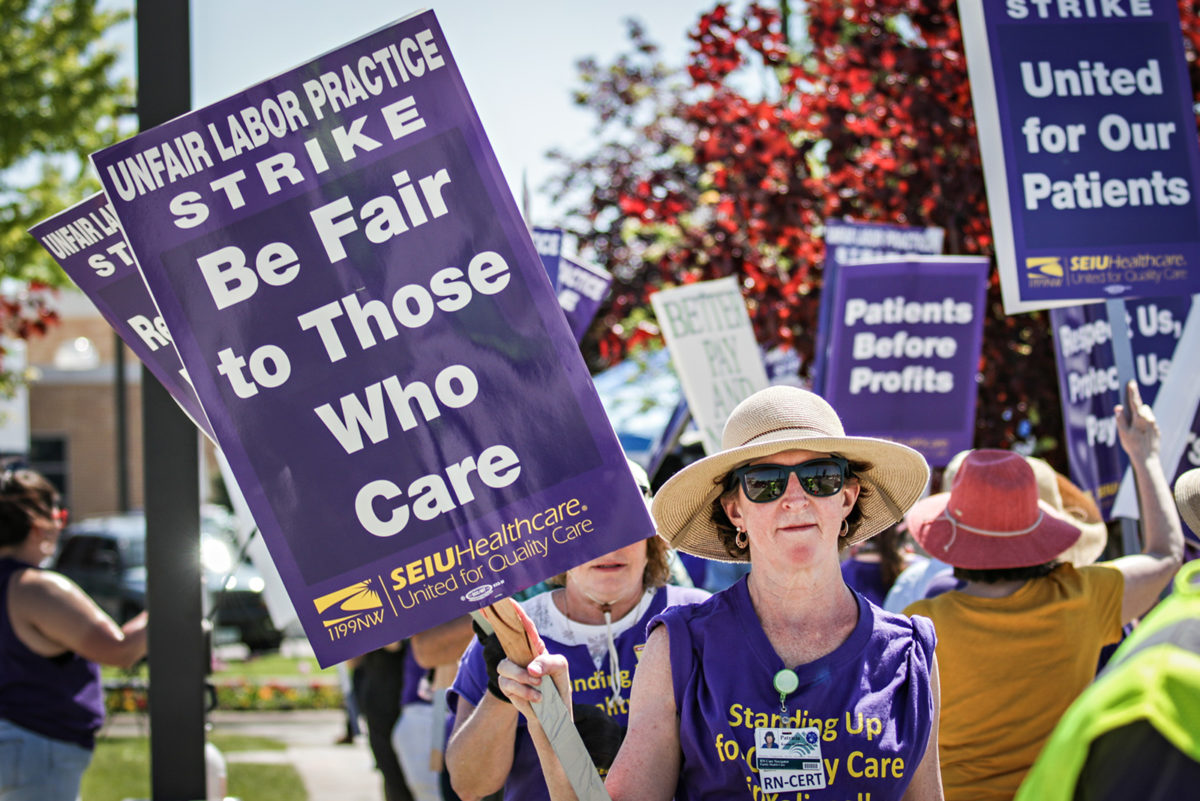Logan Health Nurses Enter Third Day of Unfair Labor Practice Strike
Federal labor investigation determines former nurse’s claim of retaliatory termination for union activity has merit; hospital executives say “accusations and filings” are a union effort to “take the focus off of their inability to reach a fair labor contract”
By Myers Reece
Nurses lined the streets near Logan Health on Wednesday, waving signs at cars honking in support as Tracy Chapman’s “Talkin’ ‘bout a Revolution” blared through loudspeakers and people lined up for barbecue at a food truck.
Despite the festive atmosphere, the reasons for gathering were decidedly serious. Nurses represented by SEIU Healthcare 1199NW were in day two of a three-day unfair labor practice strike to protest what they say is bad-faith bargaining by Logan Health management amid ongoing but faltering negotiations.
Nurses are now in the third day of the strike, which kicked off at 7 a.m. on Tuesday and is scheduled to end at 6:59 a.m. tomorrow.
In recent weeks, the union and management have accused each other of intimidation and misrepresenting negotiations, while a contingent of Logan Health nurses calling itself Nurses and Community Unite (NACU) has filed a complaint accusing SEIU of coercion during an early May vote on whether to strike.
NACU also filed a petition on Tuesday with the National Labor Relations Board (NLRB) seeking to hold a vote on severing ties with SEIU. Meanwhile, SEIU has filed at least 15 complaints with the NLRB against Logan Health alleging labor-law violations.
Amid the flurry of filings, at least two SEIU complaints have worked their way through NLRB proceedings, including one now scheduled for a hearing this summer. That case involves Maggie Honcoop, a former nurse who said she was fired in retaliation for a union-related post on her Facebook page. The NLRB found her complaint to have merit, and an administrative judge will render a ruling at the hearing, likely in August.
Honcoop said after she posted her frustration about people stealing pro-union signs out of yards, she was given the maximum number of disciplinary points, despite having never received a single disciplinary point during her three years as a registered nurse at Logan Health, preceded by three years as a medical assistant.
With the maximum disciplinary points on her record, Honcoop said she was one infraction away from termination, and was subsequently accused by hospital management of searching through a patient’s room and stealing items out of the patient’s duffle bag, allegations that she said were “proven to be false.” She said the hospital later acknowledged that the patient didn’t have a duffle bag.
“But despite being proven inaccurate, they still felt terminating me was the best solution,” Honcoop said.
Honcoop added that the patient never mentioned the allegations, and was in fact happy with her care, as was the provider.
“This wasn’t a patient complaint; this was a staff member complaint,” she said.

Honcoop filed her charges with the NLRB on Feb. 3, and after her case was determined to have merit and sufficient evidence, the multiple charges were consolidated into a complaint filed by the NLRB on May 27.
Logan Health officials responded to Honcoop’s case last night in a statement.
“SEIU wants to take the focus off of their inability to reach a fair labor contract for the RNs by continuing to make accusations and filings with the NLRB,” the statement read. “What is even more telling is the recent news of a decertification vote which speaks volumes regarding whose behavior has been inappropriate.
“We are very comfortable that our behavior has been professional and respectful of the union’s rights even though they have chosen not to reciprocate.”
Logan Health is represented by Michael Moberg of Jackson Lewis P.C., a Minnesota law firm. Moberg is a nationally known labor attorney who represents employers. SEIU is representing Honcoop.
SEIU says Honcoop “experienced months of retaliation that impacted her work and personal life before her firing.” Honcoop also said she was blackballed from employment at affiliate institutions but secured a job elsewhere locally.
“The community needs to know how nurses are treated at this facility, not only because this is where they seek their health care but because this is the only option,” Honcoop said, adding: “You’re never going to get bad care here because of the nurses. The nurses here are exceptional. The providers are exceptional. The barrier is with administration.”
The NLRB says under statute it can’t assess penalties, but it can seek “make-whole remedies” such as reinstatement and backpay for discharged workers. It can also petition a U.S. District Court for temporary injunction orders to require employers to take certain actions.
The NLRB notes that most cases, if an investigation finds sufficient evidence to support the charges, are settled between the parties. Amy Clark, SEIU 1199NW’s communications director, said in her experience it’s rare for a complaint to reach this stage.
“This is very uncommon,” she said.
Clark, who traveled from Seattle to join the strike, estimated up to 300 nurses turned out to strike on the first day, and although she said fewer people usually show up on later days, she was impressed with the numbers on Wednesday.
“Turnout has really been great,” Clark said.

One of the striking nurses, Anne Martin-Giblin, said she has seen the working environment deteriorate in her 14 years with the hospital system, including with the introduction of far more traveling nurses instead of staffed nurses. She also said wages haven’t kept up with spikes in cost of living.
“This is a time in my life where I have to take a stand and do what’s right,” Martin-Giblin said. “I’m a single mom with three kids and I have to be a role model for them and show them what’s important.”
Another nurse, John Fitch, said starting pay for Logan Health nurses is below small-town hospitals such as Cut Bank, Glasgow and Sidney. The bargaining team wants a starting base rate of $29.75 to bring it in line with comparable hospitals in Bozeman, Billings and Missoula, but Fitch said management is offering $28.
“That’s what the market is paying,” he said. “We’re the premier hospital in Montana, in my opinion.”
Fitch also said premiums for work such as night shifts and on-call duties, as well as vacation accrual rates, are lagging.
“The move to a corporate model of healthcare at a community-based hospital has been hard on nurses,” he said.
Nurses say working conditions have led to difficulty in recruitment and retention of staff, impacting morale and patient care, among other grievances.
Dr. Craig Lambrecht, Logan Health’s CEO and president, wrote in a letter to employees on Tuesday that he had “heard reports of bullying and intimidation toward nurses who have chosen to cross the picket line and who do not share the same view as SEIU.”
“We have also heard from patients that negative nursing union discussions were had while they were in our hospital receiving their treatment,” Lambrecht said. “I could not be more disappointed. Threatening texts and comments should never be part of a caregiver family nor should negative commentary be said during a patient’s treatment or be part of a patient’s experience.”
Hospital executives said they secured enough nurses to provide care during the strike, through a combination of traveling nurses and nurses who chose not to strike.
“As a caregiving family, we will weather this disrupting event that is singularly designed to damage our organization and harm the very mission we work so hard to ensure,” Lambrecht said.
The nurses opting to work instead of strike reflects a schism in the bargaining unit that is also on display with the establishment of the NACU, as well as the filings the group has submitted against SEUI.

Shiela Stencel, one of NACU’s organizers, voted against unionizing in the July 2019 secret-ballot election. She notes that Montana isn’t a right-to-work state, so all 650 nurses in the bargaining unit created by the vote are compulsory union members as a condition of employment, but they can choose not to strike, as a number of nurses have.
Stencel accuses SEIU of being out of touch with local interests, as well as “divisiveness and bullying.” She also believes a number of union demands are unreasonable, including lower staff-to-patient ratios, which she said are already better than the national standard.
Nevertheless, she said she wishes her pro-union colleagues the best, although she and others in NACU want SEIU out of the picture.
“They are my coworkers and sisters and brothers in nursing, but I feel like some of their demands are unreasonable and beyond the industry standard and national standard,” she said.
“I don’t want to discount their pain,” she added. “Obviously there are some things that have to be addressed, but I just believe it can be done in a civil, respectful manner without a Seattle union disrespecting and dishonoring our workplace. They’re tearing apart our community.”
Stencel said Wednesday that NACU’s petition to separate from SEUI had garnered 270 signatures out of the 650 nurses involved in the bargaining unit. NLRB will review the petition, and if approved, Stencel said the board will set an election date for the secret-ballot vote.
Nurses including Shannon Fitch, a registered nurse and member of the bargaining team, maintain that it’s management behaving divisively, not the union.
“Everything they do is divisive,” she said. “Everything they do is to try to pit the union employees against the non-union employees because they don’t want the non-union employees to organize with SEIU.”
While supporters of NACU may have been opting not to strike on philosophical grounds, Fitch said some nurses in her department simply couldn’t afford not to work for three days and stayed on the job.
“But I know they’re supporting us from the inside,” she said. “We’re all working toward a common goal, which is patient safety, better benefits, all of those things. We’re all supporting each other.”